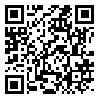Volume 6, Issue 2 (April 2022)
AOH 2022, 6(2): 1243-1249 |
Back to browse issues page
Download citation:
BibTeX | RIS | EndNote | Medlars | ProCite | Reference Manager | RefWorks
Send citation to:



BibTeX | RIS | EndNote | Medlars | ProCite | Reference Manager | RefWorks
Send citation to:
Fallah Madvari R, Zare Sakhvidi M J, kargar Shouroki F, Sefidkar R, babaee F, Bagheshahi M et al . Investigating Corona Disease Anxiety in Nurses and Its Relationship with Cognitive Flexibility: A Case Study. AOH 2022; 6 (2) :1243-1249
URL: http://aoh.ssu.ac.ir/article-1-318-en.html
URL: http://aoh.ssu.ac.ir/article-1-318-en.html
Rohollah Fallah Madvari1 

 , Mohammad Javad Zare Sakhvidi1
, Mohammad Javad Zare Sakhvidi1 

 , Fatemeh Kargar Shouroki1
, Fatemeh Kargar Shouroki1 

 , Reyhane Sefidkar2
, Reyhane Sefidkar2 
 , Fatemeh Babaee1
, Fatemeh Babaee1 
 , Mohadeseh Bagheshahi1
, Mohadeseh Bagheshahi1 
 , Mahdi Jafari Nodoushan *
, Mahdi Jafari Nodoushan * 
 3
3


 , Mohammad Javad Zare Sakhvidi1
, Mohammad Javad Zare Sakhvidi1 

 , Fatemeh Kargar Shouroki1
, Fatemeh Kargar Shouroki1 

 , Reyhane Sefidkar2
, Reyhane Sefidkar2 
 , Fatemeh Babaee1
, Fatemeh Babaee1 
 , Mohadeseh Bagheshahi1
, Mohadeseh Bagheshahi1 
 , Mahdi Jafari Nodoushan *
, Mahdi Jafari Nodoushan * 
 3
3
1- Occupational Health Research Center, Department of Occupational Health Engineering, School of Public Health, Shahid Sadoughi University of Medical Sciences, Yazd, Iran.
2- Center for Healthcare Data Modeling, Departments of biostatistics and Epidemiology, School of public health, Shahid Sadoughi University of Medical Sciences, Yazd, Iran
3- Occupational Health Research Center, Department of Occupational Health Engineering, School of Public Health, Shahid Sadoughi University of Medical Sciences, Yazd, Iran. , mjn495@gmail.com
2- Center for Healthcare Data Modeling, Departments of biostatistics and Epidemiology, School of public health, Shahid Sadoughi University of Medical Sciences, Yazd, Iran
3- Occupational Health Research Center, Department of Occupational Health Engineering, School of Public Health, Shahid Sadoughi University of Medical Sciences, Yazd, Iran. , mjn495@gmail.com
Abstract: (779 Views)
Background: The spread of coronavirus (Covid-19) had many psychological consequences. Nurses experience anxiety due to their professional duties. Considering the importance of mental health and caring behaviors in nurses, the present study was conducted to investigate Covid-19 anxiety in nurses and its relationship with cognitive flexibility. Method: The present study was conducted on 100 nurses of a selected hospital in 2021. Data collection tools included demographic questionnaire, Corona Disease Anxiety Scale (CDAS) and Cognitive Flexibility Inventory (CFI). Data analysis was performed through version 22 of SPSS software using Mann-Whitney, Kruskal–Wallis, independent sample t-test, one-way ANOVA and correlation tests. Results: The mean of cognitive flexibility was 96.68 (13.72). The median of Covid-19 disease anxiety was equal to 8 (9). Accordingly, the results of data analysis showed that there was no significant relationship between demographic variables and covid-19 anxiety (P>0.05). Furthermore, no significant relationship was found between cognitive flexibility and covid-19 anxiety (P>0.05). Conclusion: In this study, cognitive flexibility had no significant effect on Coronavirus disease anxiety. Considering the presentation of contradictory results in this field, authors suggest that a similar study be conducted with a larger sample size and different variables be taken into account.
Type of Study: Research |
Subject:
Special
Received: 2022/02/26 | Accepted: 2022/04/15 | Published: 2022/05/29
Received: 2022/02/26 | Accepted: 2022/04/15 | Published: 2022/05/29
Send email to the article author
| Rights and permissions | |
 |
This work is licensed under a Creative Commons Attribution-NonCommercial 4.0 International License. |





